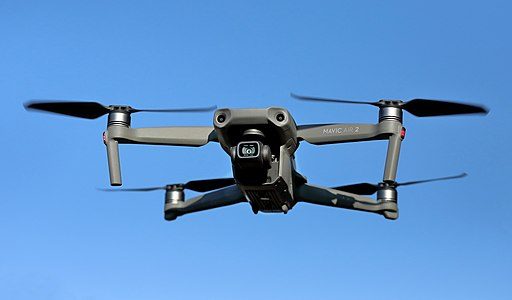


 C.Stadler/Bwag, CC BY-SA 4.0
C.Stadler/Bwag, CC BY-SA 4.0
As legislative efforts to ban or restrict Chinese-made drones intensify in the U.S., the US drone industry finds itself increasingly divided. Chinese drone manufacturer DJI dominates the global market with an estimated 65-85% market share, making it the platform of choice for many U.S. drone service providers, first responders, and software companies. However, growing concerns over security and supply chain vulnerabilities have led US lawmakers to push for greater restrictions on Chinese drones, aiming to foster a robust domestic drone manufacturing industry.
Lawmakers advocating for the ban argue that relying on Chinese technology poses significant security risks, particularly in critical sectors like defense and public safety. In addition, in the event of geopolitical conflict or supply chain disruptions, the U.S. could be left without access to essential drone platforms. These concerns have prompted calls to limit the use of federal funds to purchase Chinese drone platforms, and to develop a resilient domestic drone industry that can compete with Chinese manufacturers and ensure the U.S. retains a leadership position.
On the other side of the debate, some industry stakeholders fear that limiting access to Chinese drones—especially DJI’s mature and affordable platforms—could stifle innovation and slow growth. Drone service providers, software developers, and first responders worry that restrictions could hurt their operations and diminish the overall progress of the U.S. drone sector. This divide has left the industry grappling with how to balance security concerns with economic realities.
A Call for Unity and Legislative Action at Commercial UAV Expo
Against this backdrop, the opening keynote at the Commercial UAV Expo in Las Vegas on September 4, 2024, delivered by Lisa Ellman and Gretchen West, co-founders of the Commercial Drone Alliance, called for unity and collaboration across the U.S. drone industry. Their remarks underscored the need for the sector to come together to innovate and to push for critical legislation that will enable the commercial drone industry to thrive.

 Lisa Ellman, co-founder of the Commercial Drone Alliance
Lisa Ellman, co-founder of the Commercial Drone Alliance
Lisa Ellman, a leading UAS attorney and Executive Director of the Commercial Drone Alliance, acknowledged the divisions caused by the legislative push to restrict Chinese-made drones, while stressing that the U.S. drone industry is able to meet the challenges ahead and must remain focused on the larger goals of developing the technology and policies that will allow the commercial drone sector to scale.
“We can out-innovate other countries,” Ellman said, emphasizing the strength of the U.S. drone sector. “The good news is that the commercial drone industry in the U.S. has matured to the point that we are a subject of laser focus in Congress.” While the Commercial Drone Alliance has remained neutral on the issue of bans on Chinese drone technology, they have focused instead on listening to both legislators and industry stakeholders. “Where we have found common ground is on bolstering the commercial drone industry in the United States,” she continued. “We, the United States, are the global leader in advanced aviation… it’s our role to keep us there.”

 Gretchen West, co-founder of the Commercial Drone Alliance
Gretchen West, co-founder of the Commercial Drone Alliance
Ellman underscored that the industry’s ability to advance depends on its willingness to collaborate. She pointed to the successful passage of the FAA Reauthorization Act as an example of what can be achieved when the industry comes together.
Gretchen West echoed these sentiments, recognizing the complexity of the issues facing the industry but calling for unity in the face of division. “These are hard issues,” she said. “It’s more important than ever for us to work together.”
Read more:
Miriam McNabb is the Editor-in-Chief of DRONELIFE and CEO of JobForDrones, a professional drone services marketplace, and a fascinated observer of the emerging drone industry and the regulatory environment for drones. Miriam has penned over 3,000 articles focused on the commercial drone space and is an international speaker and recognized figure in the industry. Miriam has a degree from the University of Chicago and over 20 years of experience in high tech sales and marketing for new technologies.
For drone industry consulting or writing, Email Miriam.
TWITTER:@spaldingbarker
Subscribe to DroneLife here.





Related Posts
Windracers ULTRA Achieves 2,000km Range with Heavy-Lift Payload Capability
Walmart and Wing Launch Major Drone Delivery Expansion from Houston
Antigravity A1: World’s First 8K 360 Drone Now Available